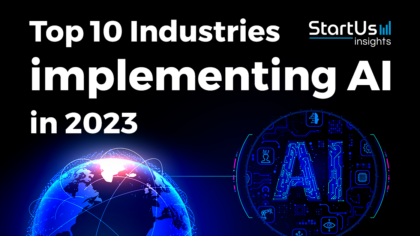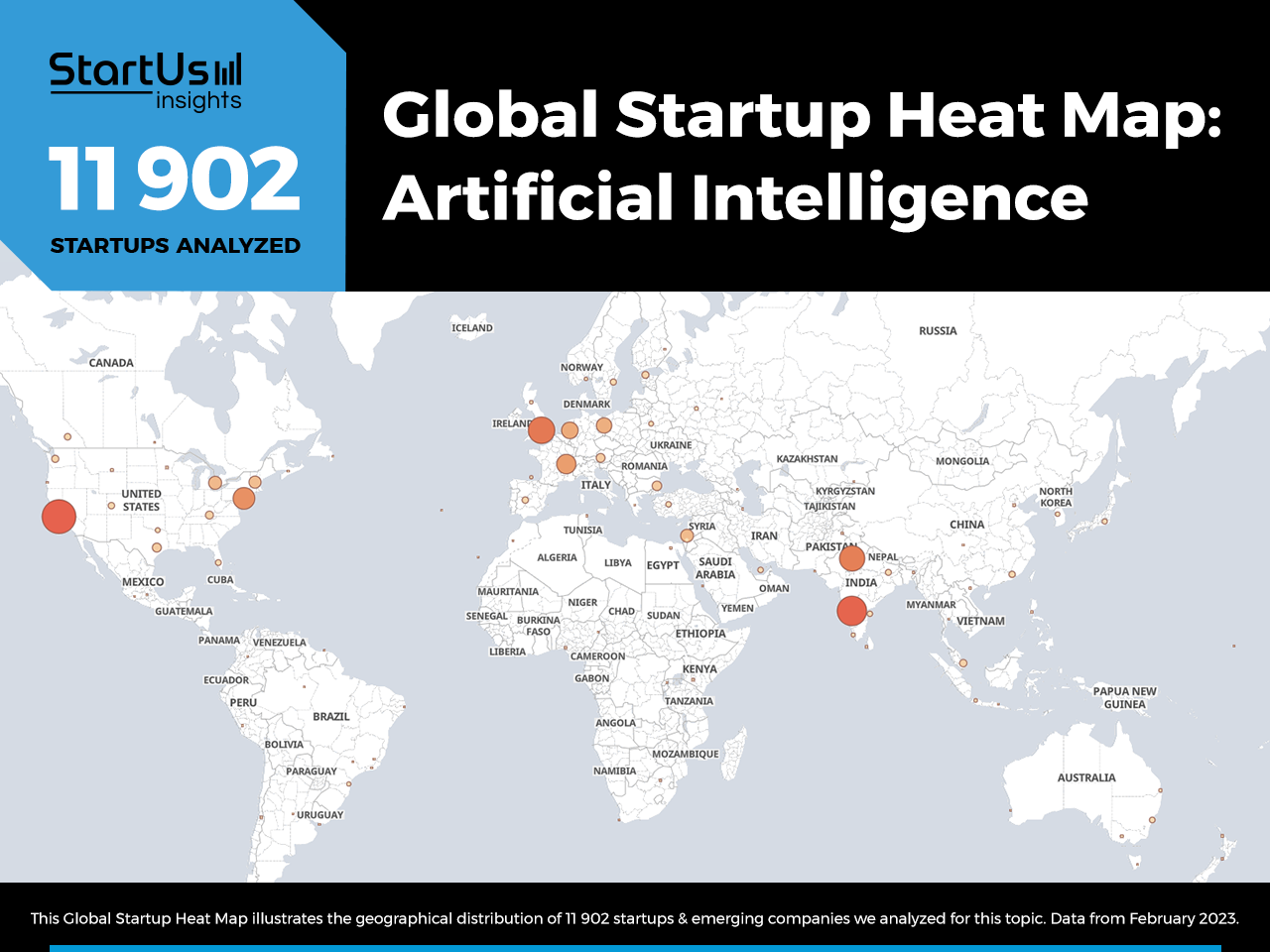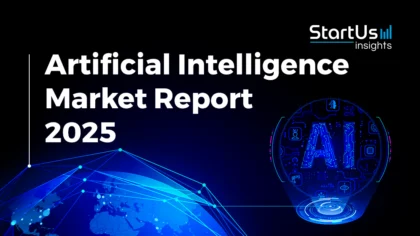Accelerate Productivity in 2025
Reignite Growth Despite the Global Slowdown
Artificial intelligence (AI) improves industrial operations and automates back-office tasks through pattern recognition. This allows businesses to save time and optimize resource utilization. That is why companies integrate AI and AI-based data processing techniques like machine learning and natural language processing (NLP) into their workflows. We give you data-driven innovation insights based on our analysis of 11902 AI startups & technologies so that you do not miss out on emerging data processing solutions. This time, you get to discover top artificial intelligence examples impacting 10 industries.
Tree Map reveals top Examples of Artificial Intelligence across 10 Industries
Based on the Innovation Map, the Tree Map below illustrates the top applications of artificial intelligence across 10 industries in 2023 and 2024. As AI aids data-driven decision-making, it greatly impacts the healthcare, retail, logistics, and energy industries. It collects and analyzes the data from sensors, electronic records, and other data management systems to identify patterns and trends to optimize operations.
Likewise, the manufacturing, FinTech, and cybersecurity industries leverage AI-based predictive analytics to anticipate risk. On the other hand, real estate and retail companies enhance customer experiences and engagement through AI-powered solutions. Lastly, the EdTech sector uses AI to improve school management while the pharma industry utilizes it to accelerate drug development and optimize pharma manufacturing.
Global Startup Heat Map covers 11902 AI Startups & Scaleups
The Global Startup Heat Map below highlights the global distribution of the 11902 exemplary startups & scaleups that we analyzed for this research. Created through the StartUs Insights Discovery Platform that covers 3 790 000+ startups & scaleups globally, the Heat Map reveals that the US and India have a high concentration of AI startups, followed by West Europe.
Below, you get to meet 10 out of these 11902 promising startups & scaleups as well as the solutions they develop. These AI startups are hand-picked based on criteria such as founding year, location, funding raised, & more. Depending on your specific needs, your top picks might look entirely different.
Top Artificial Intelligence Examples across 10 Industries (2023 & 2024)
1. Healthcare
The healthcare sector leverages AI to improve clinical decision-making and access to care. For instance, many startups develop machine learning-based solutions to analyze medical scans and offer decision support for disease diagnosis. Additionally, AI enhances the use of electronic health record (EHR) data to identify trends and personalize healthcare delivery. This allows hospitals and doctors to ensure timely interventions and reduce patient risks.
Hospitals also use AI-based intelligent process automation (IPA) to automate manual tasks like transcribing and patient visit scheduling. Further, AI-powered medical devices enhance the performance of telehealth services and remote patient monitoring, delivering prompt medical care.
SAIVA advances Patient Monitoring & Triaging
SAIVA is a US-based startup that facilitates patient monitoring and triaging. The startup’s solution combines EHR data and machine learning to collect and analyze patient records. These include vital signs, lab results, diagnoses, and progress notes. It also analyzes changes logged across nursing shifts to make connections across patient-specific data points. This allows physicians and nurses to identify risk indicators and plan clinical interventions, reducing rehospitalizations.
2. Retail
Retail companies primarily utilize AI to enhance customer experience through personalized product offerings and assisted in-store journeys. At the same time, the technology improves retail operations through predictive inventory planning and stock allocation. These solutions allow retailers to optimize backend operations and ensure customer satisfaction, saving costs and increasing profits.
AI-driven customer analytics further enable them to identify market trends, improve product pricing, and find opportunities to enhance sales. Lastly, AI-powered in-store analytics provides shelf intelligence that allows retailers to increase visibility into stocks and identify underperforming products.
Signatrix offers In-Store Visual Intelligence
Signatrix is a German startup that provides in-store visual intelligence. The startup’s hardware and software solutions, which use AI, integrate into existing CCTV systems to analyze store activities. It offers aggregated analytics to identify recurring trends and validate promotional success. Moreover, Signatrix’s solutions allow retailers to detect in-store incidents to aid staff and store management. This, in turn, enables them to mitigate inefficiencies and improve customer experience.
3. Logistics
Lack of transparency in operations, and supply chain, is a major hurdle in the logistics industry. AI leverages the data from sensors and data management systems across the logistics value chain to identify to impart transparency into operations.
For example, some startups offer workflow optimization solutions that promptly identify delays and failures in pick-and-place machines that affect delivery times. Such solutions enable logistics companies to avoid package mishandling and maltreatment, improve inventory management, and enhance warehouse efficiency. AI in logistics, thus, ensures on-time delivery of packages and boosts revenues.
Hedyla aids Logistics Route Optimization
Hedyla is a Spanish startup that offers logistics route optimization software. It allows operators to import orders through spreadsheets or use the startup’s application programming interface (API) to integrate order information. The software then leverages AI to optimize route planning based on daily orders, send routes to drivers, and discover bottlenecks. This allows logistics companies to minimize fleet size, increase the number of deliveries, reduce costs, and decrease carbon emissions.
4. Manufacturing
Integration of the Internet of Things (IoT) and big data into production floors requires manufacturers to leverage AI. Otherwise, the digital touchpoints these technologies create go unutilized. AI-driven solutions in the manufacturing sector facilitate industrial automation, process monitoring, and production optimization.
It enables them to increase visibility into operations and use advanced analytics to drive predictive maintenance. Consequently, manufacturing companies improve production efficiency, reduce waste, decrease labor costs, and save operational costs.
Asquared facilitates Manufacturing Equipment Monitoring
Asquared is an Indian startup that develops Equilips 4.0, a device for manufacturing equipment monitoring. It combines machine learning, edge computing, and real-time sound analytics to identify sounds and calculate performance and productivity parameters.
Equilips 4.0 then offers real-time quality measurement and operational statistics for manufacturing processes. Floor operators utilize the startup’s companion mobile or web app to receive these insights and identify anomalies and failures.
5. FinTech
From customer onboarding and verification to ensuring compliance and fraud prevention, AI advances the financial services industry. Banks and non-banking financial companies (NBFCs) leverage machine learning and deep learning to analyze a range of financial data. Increased adoption of open banking systems further opens the industry to AI-based workflows.
As a result, FinTech companies automate their backend processes like customer onboarding and transaction monitoring. This, in turn, mitigates manual errors associated with profile assessment and verification, reducing the chances of fraud. AI also finds applications in customer support, fraud detection, credit risk assessment, and wealth management.
Cleareye.ai advances Anti-Money Laundering (AML)
Cleareye.ai is a US-based startup that makes Topaz AML, a fraud monitoring and detection platform. It uses machine learning, statistical algorithms, and network modeling to analyze large pools of financial data. This allows banks to monitor, intervene, investigate, and report unlawful transactions. Moreover, Topaz AML reduces false positives in transaction monitoring and enables banks to mitigate unwanted, time- and cost-intensive investigations.

6. Cybersecurity
AI plays a significant role in strengthening cybersecurity across industries. Through AI-based cybersecurity solutions, businesses are able to analyze all digital touchpoints in their network. This enables a shift from event-based cyber risk strategies to predictive cybersecurity measures.
Besides, with more dynamic data compliance policies, AI automates data access and security management throughout the business infrastructure. This allows companies to mitigate expensive legal suits due to data theft or sensitive data leaks. AI in cyberspace also improves unknown threat detection, vulnerability management, response times, and device monitoring.
Protos Labs provides Cyber Risk Intelligence
Protos Labs is a Singaporean startup that creates Nexus, a cloud-based cyber risk intelligence platform. It leverages statistical models, AI, and a proprietary thread-based approach built on MITRE’s threat-informed defense strategy.
Nexus uses these technologies to analyze real-world threats, exploits, and vulnerabilities and correlates threats with dark web chatter and asset information. This allows enterprises and insurers to assess cyber control effectiveness and quantify risk exposure, optimizing cyber investment.
7. Real Estate
AI-powered virtual assistants have a great impact on lead conversion on property deals. They generate interest among potential buyers and identify sales opportunities better. That is why many real estate and property management companies are using it. Additionally, they utilize AI to personalize services and aggregate property information to assess profitability.
Some startups also utilize AI to increase buyer engagement and optimize advertisements, improving sales. Moreover, the technology analyzes market trends using private and public sourced data to predict appraisals and market value, increasing profits for real estate firms.
AiRE facilitates Real Estate Lead Generation
AiRE is an Australian startup that develops RiTA, an AI-powered lead generation platform for real estate. It integrates into customer relationship management (CRM) systems to analyze property, market, and new lead data. RiTA also supports personalized two-way conversations with customers and potential leads. This allows real estate firms to enable intelligent prospecting and automate lead generation.
8. Energy
Transitioning to a smart and clean grid is forcing the energy industry to rely on advanced data processing systems to aid load and demand-side management. Consequently, the energy generation and distribution markets see investments in advancing AI integration. Through this, energy companies are able to analyze historic energy consumption patterns and forecast future demands.
Besides, adopting AI in an IoT-based infrastructure improves visibility into energy assets and enables predictive maintenance. This allows energy companies to avoid unexpected downtimes, maintenance costs, and outages.
Delfos aids Renewable Energy Asset Monitoring
Delfos is a Brazilian startup that makes Delfos I.M., a renewable energy asset monitoring platform. It combines operational data from sensors, legacy systems, and OPC data access with machine learning models to generate key insights into asset operations.
Based on the asset data, the platform identifies the most suitable prediction model to forecast failures. This allows renewable energy companies to reduce unexpected downtimes, optimize maintenance windows, and scale up operational knowledge.
9. EdTech
The wide adoption of remote learning is increasing the workload for teachers and school administrators. AI in the education industry automates attendance tracking, activity monitoring, and curriculum management, among others. This reduces the administrative burden on the teachers as well as allows them to optimize classroom and student management.
Schools and colleges also leverage AI to create a personalized curriculum for students and increase their engagement. As a result, it improves their cognitive abilities. Further, AI-based chatbots that resolve student queries and smart invigilators that tackle malicious practices during online examinations.
Edusuite develops a Campus Management System
Edusuite is a Filipino startup that provides a campus management system for schools, colleges, and universities. It uses AI to aggregate student and administration data to automate and enhance various administration tasks. These include student data analysis, class enrolment prediction, class schedule creation, and curriculum management, among others. This, in turn, allows instructors and school administrators to avoid time-intensive admin tasks and optimize campus management.
10. Pharma
While pharma manufacturing utilizes AI to optimize production operations, the primary use case of AI in pharma is drug development. From novel hit discovery to hit-to-lead and lead optimization, AI accelerates drug discovery. For example, some startups develop predictive models that combine clinical, genetic, and phenotypic data to create cell-based disease models.
Such solutions allow pharma companies to identify otherwise hidden target molecules or subtypes, speeding up drug discovery and development. Other applications of AI in pharma also include clinical trial risk assessment and precision medicine.
MindRank advances AI-enabled Small Molecule Drug Discovery
MindRank is a Chinese startup that offers Molecule Pro, a small molecule drug discovery platform. It leverages AI and bioinformatics to speed up and reduce costs associated with drug discovery. Moreover, the startup focuses on difficult-to-drug molecular targets. MindRank already delivered a small molecule allosteric inhibitor PPC to a BioTech company, which is in investigational new drug application (IND)-enabling studies.
Discover All AI Startups
Every day, new startups and technologies emerge that improve and transform the data processing capabilities of AI-based solutions. These solutions span a range of applications from robotic process automation (RPA) to process optimization to digital twins and predictive analytics. They enable businesses and industries to identify process inefficiencies, speed up operations, and eliminate manual errors. That is why we see growing investment in AI. Get in touch to identify specific AI startups & solutions that advance your business!



![10 Emerging AI Solutions for Material Science [2025]](https://www.startus-insights.com/wp-content/uploads/2025/06/AI-Solutions-for-Material-Science-SharedImg-StartUs-Insights-noresize-420x236.webp)
![10 Top AI Solutions for Telecom Operations [2025]](https://www.startus-insights.com/wp-content/uploads/2025/06/AI-Solutions-for-Telecom-Operations-SharedImg-StartUs-Insights-noresize-420x236.webp)




